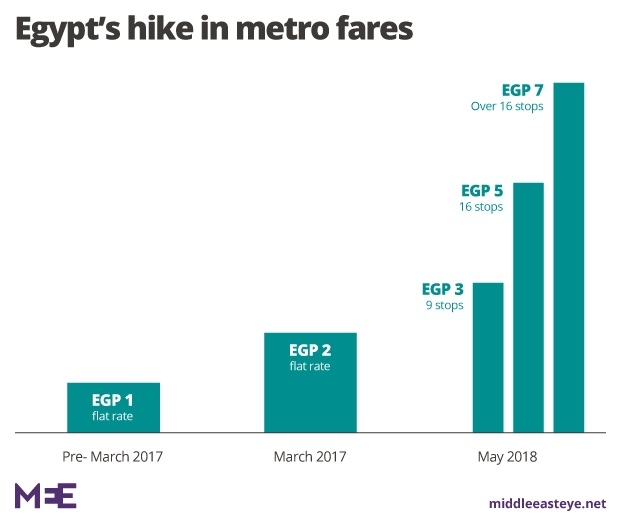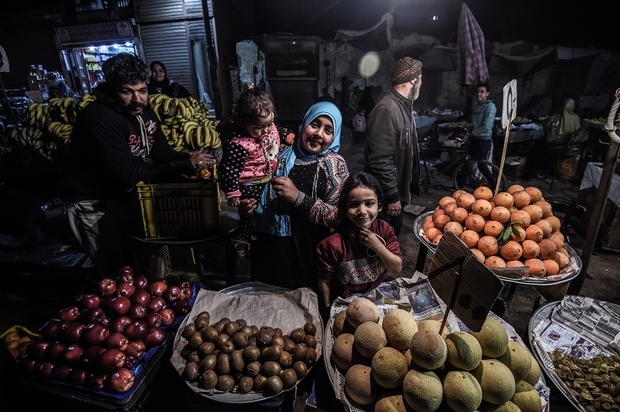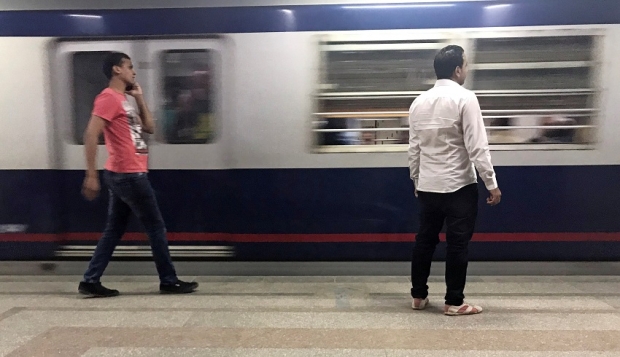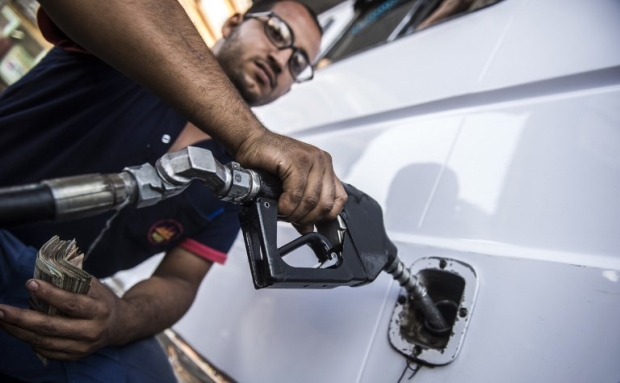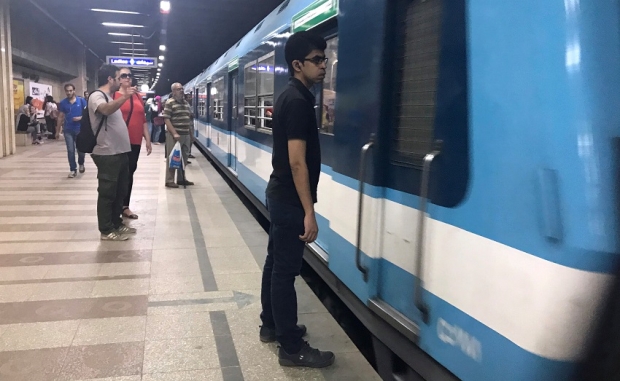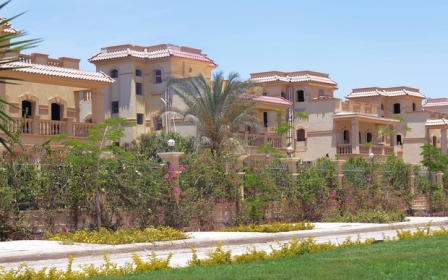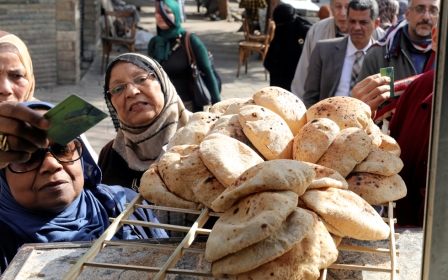‘We are trapped and there is no way out': Egyptians outraged by hike in metro fares
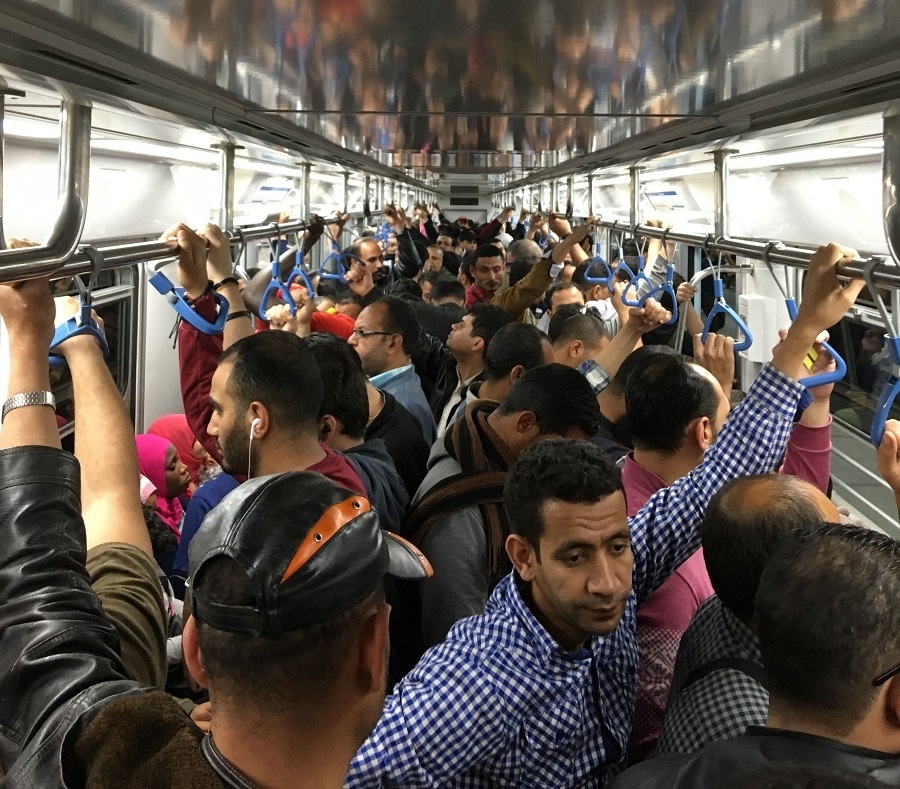
CAIRO - Festive Ramadan decorations hanging on the walls of a downtown metro station are doing little to brighten the mood of disgruntled commuters rushing to take the metro, following a recent hike in ticket fares.
It means that a third of our income goes only to transportation. I don’t know how a family of five should live with the remaining EGP 2,000 ($111.6)
- Samia, government employee
Dozens lined up in front of the ticket windows under signs showing the new ticket prices announced by the government on 10 May.
Security presence was minimal in most of the metro stations, with police officers deployed mostly in the main ones, where angry and sporadic protests broke out following the government's announcement. At least 30 protesters were arrested by security forces and several have since been released.
The fares range from EGP 3 ($0.17), EGP 5 ($0.28) and EGP 7 ($0.39), for 9, 16 and over 16 stops respectively. This is the second increase in over one year. In March 2017, the government doubled the price of the metro tickets to EGP 2 ($0.11), putting a strain on nearly three million commuters who use the Cairo metro daily.
“My husband and I and our three kids use the metro daily. How are we going to afford this significant increase?” Samia, who declined to give her last name for security reasons, told Middle East Eye.The metro is safe. I don’t have to worry about sexual harassment because I ride the women-only carriages. But it seems that even safety is now too expensive for us
- Samia, government employee
Samia is a government employee who lives in Helwan, a southern Cairo suburb at the end of one of the city’s three main metro lines. A one-way commute to her work usually takes up to one hour and a half. For her, the metro has always been the most efficient means of transportation. It is a cheap and quick alternative to other transportation options like buses and microbuses that consume more time, as they meander through the capital's congested streets, especially during rush hour.
There is no direct microbus that can take her from home to work. She would have to make three changes in a single trip, which is also a much more expensive option, costing her a total of EGP 18 ($1.01) for a daily round trip.
“The metro is safe. I don’t have to worry about sexual harassment because I ride the women-only carriages. But it seems that even safety is now too expensive for us,” she said.
Samia’s household income is EGP 3,000 ($167.5), with a monthly budget for transportation for all family members reaching EGP 400 ($22.35) before the increase in ticket prices.
No alternative?
President Abdel Fattah al-Sisi defended the hikes during a youth conference this week, saying they are necessary, otherwise Egypt would have to borrow money and fall under more debt, which would put a burden on the coming generations. He added that the decision “was not surprising”.
“This is a plan that is being implemented for four years in all sectors, in electricity, water, and sewage. There is no other alternative,” he said.
For me, if the people asked me to leave, I will just say goodbye
- Abdel Fattah al-Sisi
“Nobody take offense to what I’m about to say, if I did not take these decisions, nobody else will," he continued."They would get into a confrontation and have people come out and yell ‘Leave.’ But if you told me to leave I would just say ‘Goodbye."
The government justified the recent increase, stating that the metro had accumulated losses reaching EGP 618.6 million ($34.5m), according to a statement by the Ministry of Transportation that didn’t specify a time span.
A recent report by the Egyptian Initiative for Personal Rights (EIPR), however, challenged the claims made by Sisi and the ministry concerning the loss-making metro system. It is titled: “Not a deficit: The metro is not incurring losses, the state finances the investments from the pockets of the poorest segments.”
The losses announced by the ministry, EIPR argued, is the sum of spending on wages, subsidies and the purchase of goods and services as well as the cost of investment that includes building new metro stations and buying new carriages.
In effect, the recent hikes are used to finance the cost of investments. “Investments in public services are a main role played primarily by the state, and the government should not deal with it as a budget deficit. The government needs to finance the cost of investment in the metro’s infrastructure by implementing a more just progressive taxation policy,” the report added.
‘What about the people?’
The increase is triggered by an IMF-supported austerity plan carried out by the Egyptian government as part of its economic reforms.
Investments in public services are a main role played primarily by the state, and the government should not deal with it as a budget deficit
- Egyptian Initiative for Personal Rights report
With the expected fuel subsidy cuts, the metro remains the cheaper option that most commuters will continue to rely on.
For Hanan Bilal, a medical student at a university in Cairo, the metro is an essential means of transportation, as she lives in Benha, the capital of the northern Qalyoubiya governorate. It takes Bilal at least two hours to arrive to her university.
“I take a microbus from my city to a metro station in Shubra [a northern Cairo district] and ride the metro to reach the closest station to the university. I leave home at 5am daily to catch my mandatory 8 am laboratory. There is no alternative to the metro. Riding a cheaper microbus means I will miss my classes. I will use the metro even if I have to pay EGP 100 ($5.59) for the ticket,” she explained. If she uses the microbus, she would only save EGP 1($0.056) per ride, while adding much more time to her commute.
It is difficult for Bilal to make use of the reduced travel passes for students. “I have to catch my classes early every morning, and by the time I finish class, the ticket offices are closed (government offices usually shut down at around 3pm in Egypt). I don’t have the luxury of even subscribing to the cheaper plans,” she added.
“I do not get my salary monthly because of the financial crisis many of the media institutions face. I must give my father part of my salary for the household expenses, and I also pay for my medical expenses. After the recent increases, I will have to pay at least EGP 40 ($2.23) per day only for transportation. Because I live in Helwan, I will pay EGP 7 ($0.39) per ride, and I usually run many errands across the day, so I will pay for more than a round trip.
We are paid too little and pay too much for almost everything, and we don’t even get any better services for the money we pay.
- Ola Abdel Fattah, freelance journalist
“The government is facing financial losses, but what about the people? We are paid too little and pay too much for almost everything, and we don’t even get any better services for the money we pay. Am I supposed to borrow from others to cover my transportation expenses?” she said.
Earlier this week, Abdel Fattah could not go on a work assignment because she only had EGP 60 ($3.35) left in her pocket. “I will not spend the money I have on transportation only,” she said.
According to Abdel Fattah, the recent wave of inflation has tremendously impacted the media sector, with newspapers and channels incurring huge losses due to declining advertising revenues and increasing costs of operation. This has mostly come at the expense of journalists, who are either laid off, or paid very little. “The lucky ones get paid once every three months,” she added.
The case of Haitham Alaa is no different. The 26-year-old pharmacist works two jobs in pharmaceuticals, quality control in the morning and a pharmacy in the evening, to earn a monthly salary of EGP 4,000 ($223). Despite being single, he needs his salary to pay the mortgage installments for an apartment he bought last year, as well as other important expenses.
“I’m only left with EGP 1,000 ($55.87) to spend every month. I will have to pay at least EGP 500 ($27.93) for transportation only,” he added.
For Alaa, looking for other transportation options is not on his agenda.
“The metro is very fast and the fuel prices are going to increase anyway very soon, so the bus fares will also increase. I feel like we are all trapped and there is no way out,” he added.
Middle East Eye propose une couverture et une analyse indépendantes et incomparables du Moyen-Orient, de l’Afrique du Nord et d’autres régions du monde. Pour en savoir plus sur la reprise de ce contenu et les frais qui s’appliquent, veuillez remplir ce formulaire [en anglais]. Pour en savoir plus sur MEE, cliquez ici [en anglais].


